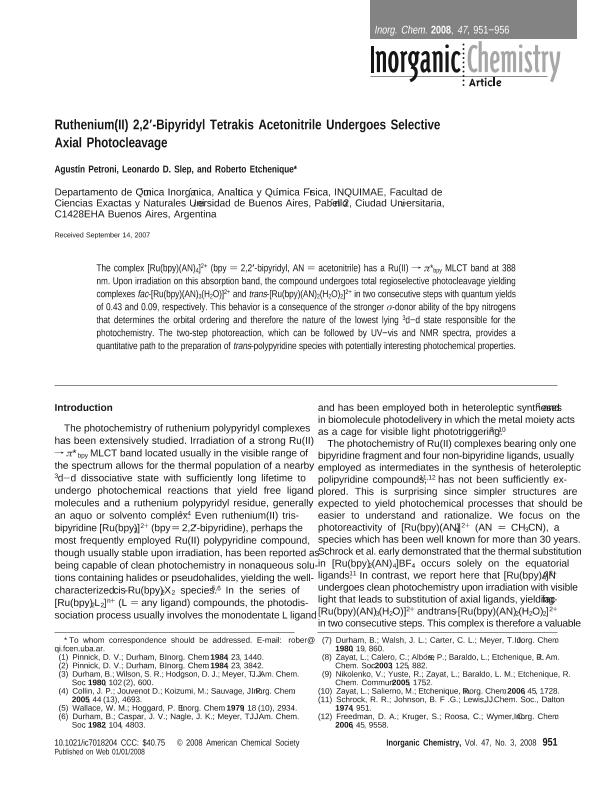Mostrar el registro sencillo del ítem
dc.contributor.author
Petroni, Agustín

dc.contributor.author
Slep, Leonardo Daniel

dc.contributor.author
Etchenique, Roberto Argentino

dc.date.available
2019-04-12T22:34:48Z
dc.date.issued
2008-02
dc.identifier.citation
Petroni, Agustín; Slep, Leonardo Daniel; Etchenique, Roberto Argentino; Ruthenium(II) 2,2′-bipyridyl tetrakis acetonitrile undergoes selective axial photocleavage; American Chemical Society; Inorganic Chemistry; 47; 3; 2-2008; 951-956
dc.identifier.issn
0020-1669
dc.identifier.uri
http://hdl.handle.net/11336/74346
dc.description.abstract
The complex [Ru(bpy)(AN)4]2+ (bpy = 2,2′-bipyridyl, AN = acetonitrile) has a Ru(II) → π*bpy MLCT band at 388 nm. Upon irradiation on this absorption band, the compound undergoes total regioselective photocleavage yielding complexes fac-[Ru(bpy)(AN)3(H2O)]2+ and trans-[Ru(bpy)(AN)2(H2O)2]2+ in two consecutive steps with quantum yields of 0.43 and 0.09, respectively. This behavior is a consequence of the stronger σ-donor ability of the bpy nitrogens that determines the orbital ordering and therefore the nature of the lowest lying 3d-d state responsible for the photochemistry. The two-step photoreaction, which can be followed by UV-vis and NMR spectra, provides a quantitative path to the preparation of trans-polypyridine species with potentially interesting photochemical properties.
dc.format
application/pdf
dc.language.iso
eng
dc.publisher
American Chemical Society

dc.rights
info:eu-repo/semantics/openAccess
dc.rights.uri
https://creativecommons.org/licenses/by-nc-sa/2.5/ar/
dc.subject
Photochemistry
dc.subject
Ruthenium
dc.subject
Dft
dc.subject.classification
Otras Ciencias Químicas

dc.subject.classification
Ciencias Químicas

dc.subject.classification
CIENCIAS NATURALES Y EXACTAS

dc.title
Ruthenium(II) 2,2′-bipyridyl tetrakis acetonitrile undergoes selective axial photocleavage
dc.type
info:eu-repo/semantics/article
dc.type
info:ar-repo/semantics/artículo
dc.type
info:eu-repo/semantics/publishedVersion
dc.date.updated
2019-03-27T18:04:01Z
dc.journal.volume
47
dc.journal.number
3
dc.journal.pagination
951-956
dc.journal.pais
Estados Unidos

dc.description.fil
Fil: Petroni, Agustín. Consejo Nacional de Investigaciones Científicas y Técnicas. Oficina de Coordinación Administrativa Ciudad Universitaria. Instituto de Química, Física de los Materiales, Medioambiente y Energía. Universidad de Buenos Aires. Facultad de Ciencias Exactas y Naturales. Instituto de Química, Física de los Materiales, Medioambiente y Energía; Argentina
dc.description.fil
Fil: Slep, Leonardo Daniel. Consejo Nacional de Investigaciones Científicas y Técnicas. Oficina de Coordinación Administrativa Ciudad Universitaria. Instituto de Química, Física de los Materiales, Medioambiente y Energía. Universidad de Buenos Aires. Facultad de Ciencias Exactas y Naturales. Instituto de Química, Física de los Materiales, Medioambiente y Energía; Argentina
dc.description.fil
Fil: Etchenique, Roberto Argentino. Consejo Nacional de Investigaciones Científicas y Técnicas. Oficina de Coordinación Administrativa Ciudad Universitaria. Instituto de Química, Física de los Materiales, Medioambiente y Energía. Universidad de Buenos Aires. Facultad de Ciencias Exactas y Naturales. Instituto de Química, Física de los Materiales, Medioambiente y Energía; Argentina
dc.journal.title
Inorganic Chemistry

dc.relation.alternativeid
info:eu-repo/semantics/altIdentifier/doi/http://dx.doi.org/10.1021/ic7018204
dc.relation.alternativeid
info:eu-repo/semantics/altIdentifier/url/https://pubs.acs.org/doi/10.1021/ic7018204
Archivos asociados
